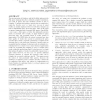Free Online Productivity Tools
i2Speak
i2Symbol
i2OCR
iTex2Img
iWeb2Print
iWeb2Shot
i2Type
iPdf2Split
iPdf2Merge
i2Bopomofo
i2Arabic
i2Style
i2Image
i2PDF
iLatex2Rtf
Sci2ools
202
click to vote
VLDB
2007
ACM
2007
ACM
Supporting Time-Constrained SQL Queries in Oracle
The growing nature of databases, and the flexibility inherent in the SQL query language that allows arbitrarily complex formulations, can result in queries that take inordinate amount of time to complete. To mitigate this problem, strategies that are optimized to return the `first-few rows' or `top-k rows' (in case of sorted results) are usually employed. However, both these strategies can lead to unpredictable query processing times. Thus, in this paper we propose supporting time-constrained SQL queries. Specifically, a user issues a SQL query as before but additionally provides nature of constraint (soft or hard), an upper bound for query processing time, and acceptable nature of results (partial or approximate). The DBMS takes the criteria (constraint type, time limit, quality of result) into account in generating the query execution plan, which is expected (guaranteed) to complete in the allocated time for soft (hard) time constraint. If partial results are acceptable th...
Related Content
| Added | 05 Dec 2009 |
| Updated | 05 Dec 2009 |
| Type | Conference |
| Year | 2007 |
| Where | VLDB |
| Authors | Ying Hu, Seema Sundara, Jagannathan Srinivasan |
Comments (0)

